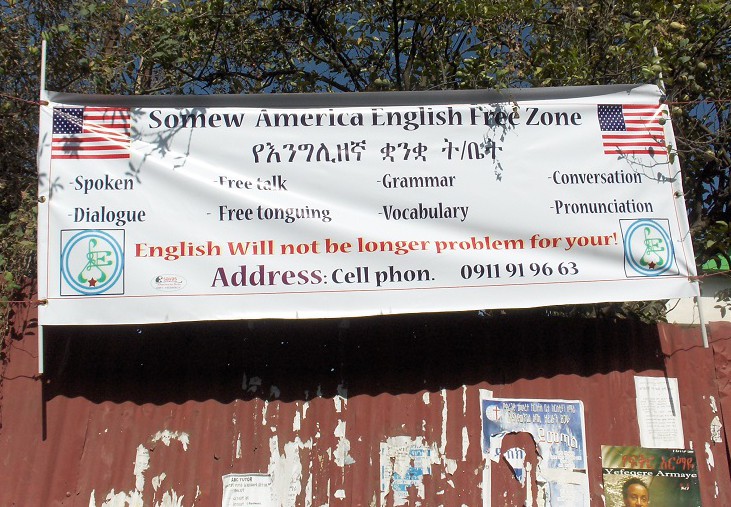"English will not be longer problem for your!"
« previous post | next post »
Yvonne Treis sent in this photograph of a sign at an “America English” language school in Addis Ababa/Ethiopia that she took in May 2009:
Yvonne has been to Ethiopia a dozen times or more for linguistic fieldwork on two Ethiopian languages (Kambaata & Baskeet) and has some conversational competence in Amharic –- not very much, but enough to find her way around the country — and can read it a bit. So she transliterates the 2nd line of the sign as:
የእንግሊዘኛ ቋንቋ ት(ምህርት)\ቤት
yä-ənglizäña* k’wank’wa tə(mərt) bet
literally: of_English language learning house, i.e. ‘English language school’
(*There is a typo in the Amharic version, too: It should be የእንግሊዝኛ yä-ənglizəña)
Comments by Yvonne:
I am not sure what “Somew” in the first line is supposed to mean. Possibly it is a name. (Although I have never heard this name in Ethiopia before….)
I also wonder about the “Free Zone”: Are there no fees to be paid? Or is it because it allows free conversations? I can’t really tell.
I especially wonder how the “free tonguing” (and the unintended sexual innuendo) can be explained…. Do you have any ideas?
When I googled around to find an explanation for “Somew”, I came across another version (even with a typo in “Engilsh”) of the same sign here:
English is the medium of instruction in Ethiopia starting from grade 7 (if not earlier) and also taught as a subject early on (in some schools starting from grade 1 or 3). I am often shocked about the low level of English competence among university students in Ethiopia, but maybe that’s no surprise if not even English language schools know the basics of English grammar.
Given what Yvonne says about the level of English competence among university students in Ethiopia, it is astonishing that it can function as the medium of instruction.


michael farris said,
March 18, 2015 @ 1:29 am
"Given what Yvonne says about the level of English competence among university students in Ethiopia, it is astonishing that it can function as the medium of instruction"
I'm astonished that anyone thinks that using a language the country has no specially strong or cultural ties with as a medium of instruction is a good idea. It sounds like an awful idea.
Why is it that virtually every European country assumes its language (or a couple of them are suitable vehicles for university instruction and almost no African country (partially excluding the Arabic speaking north) does?
Rachael said,
March 18, 2015 @ 3:23 am
"English free zone" sounds like a zone where no English is spoken, or where it's forbidden to speak English. (I guess it is actually a zone free of correct English…)
Alan Palmer said,
March 18, 2015 @ 4:37 am
In the second picture, I'm particularly intrigued by 'English less learning-lifeless processing'.
Victor Mair said,
March 18, 2015 @ 6:19 am
@michael farris
"I'm astonished that anyone thinks that using a language the country has no specially strong or cultural ties with as a medium of instruction is a good idea."
Who thinks it's a good idea?
leoboiko said,
March 18, 2015 @ 6:42 am
@Alan: That's what caught your eye? Personally, I'm more interested in the "free tonguing"……
George said,
March 18, 2015 @ 8:36 am
@ Victor Mair: "Who thinks it's a good idea?"
Well, whoever decided to do it, I would have thought.
As for Michael Farris' question about why African countries tend not to use indigenous languages for university instruction, it's about the availability of text books, isn't it?
Victor Mair said,
March 18, 2015 @ 9:02 am
@George
Aye, there's the rub.
michael farris said,
March 18, 2015 @ 9:30 am
Presumably successive Ethiopian governments think it's a good idea.
And the lack of textbooks seems more like a symptom of the underlying problem, not a reason for anything.
Dan Lufkin said,
March 18, 2015 @ 10:43 am
The lack of textbooks, I think, is more often due to lack of potential buyers for languages with only a few million speakers. The Danish economist Martin Paldam figured that it costs Denmark about four percent of its GDP to indulge in the luxury of educating its youngsters in Danish, necessarily with short press runs for the texts. Lots of universities in Scandinavia and Germany offer all-English coursework. This attracts students from many other countries who are finding it hard to get visas to study in the US.
One of the best lecturers I had at Stockholm had a sort of ecumenical approach with English 50%, Swedish 25% and German 25%, often in successive sentences. It was bewildering at first but somehow he made it work.
michael farris said,
March 18, 2015 @ 11:08 am
"I think, is more often due to lack of potential buyers for languages with only a few million speakers"
Well in Ethiopia Amharic has 22 million and Oromo about 32 million speakers so presumably the economics wouldn't be crippling.
And computerized print on demand could drive the price of textbooks way down (if there were any local will to actually educate people in local languages).
David L said,
March 18, 2015 @ 11:25 am
According to the World Bank, per capita income in Ethiopia is $470 a year — not much more than a dollar a day. So textbooks that cost a few dollars each to produce, even with print on demand, would indeed represent a substantial economic burden.
un malpaso said,
March 18, 2015 @ 11:53 am
Where can I line up for the free tonguing
George said,
March 18, 2015 @ 12:04 pm
There's a lot more to producing a text book than just printing it.
Errorr said,
March 18, 2015 @ 12:24 pm
My best friend was in an Econ post graduate program that was all English. He lived in Switzerland, went to a German University (Constance), and the students had a large cohort of Eastern Europeans (mostly Russian).
In some subjects any secondary education is so much more difficult if all the materials are in different languages and English dominates because it probably has the most scholarship already and it is more reliable for students to learn English than to translate (reliably) the knowledge into other languages.
Einstein would have his papers rejected today as both of the journals most associated with him have long since become English only.
michael farris said,
March 18, 2015 @ 12:29 pm
". So textbooks that cost a few dollars each to produce, even with print on demand, would indeed represent a substantial economic burden."
And trying to run the system in English doesn't?
John Rohsenow said,
March 18, 2015 @ 1:04 pm
Way back in the Dark Ages (i.e., the '60s when I was a student in TW) they produced cheap, authorized versions of US textbooks licensed for sale in certain African and Middle Eastern countries only.
Rubrick said,
March 18, 2015 @ 5:25 pm
There is no such thing as a free tonguing.
narmitaj said,
March 18, 2015 @ 6:00 pm
I used to travel in the Middle East and Africa for college publisher Prentice Hall. For subjects like science, engineering, medicine and various business subjects (and ELT), American and British textbooks were used in universities and technical colleges and I imagine still are (and, as someone pointed out above, also in Benelux and Scandinavia and so on). Social sciences and humanities would use local texts.
There were some textbooks licensed for reprinting on much cheaper paper in India and South East Asia and used there; they were not supposed to seep into the Middle East market.
There was also piracy. One time in Iran I was at a meeting and was told there were hundreds of pirate copies of the enormous surgery text Maingot's Abdominal Operations in the basement. You'd also see textbooks like Morrison & Boyd's Organic Chemistry pirated with an improvement – OK, they lost the full-colour, full-size high quality printing, but published the book in two volumes to make it easier for students to carry (or more likely, for the reprinters to publish).
Dan Lufkin said,
March 20, 2015 @ 11:01 am
English as a medium of instruction is another example of the QWERTY phenomenon. It's not the optimum solution, but it works and now we're stuck with it.
Victor Mair said,
March 20, 2015 @ 12:54 pm
From Heidi Krohne:
Could free-tonguing be equivalent to Berlin's "frei nach Schnauze (meaning saying something just the way you feel like it without regard to politeness, grammar or any other rules of propriety)?
Frei nach Schnauze can also mean something like "to wing it".